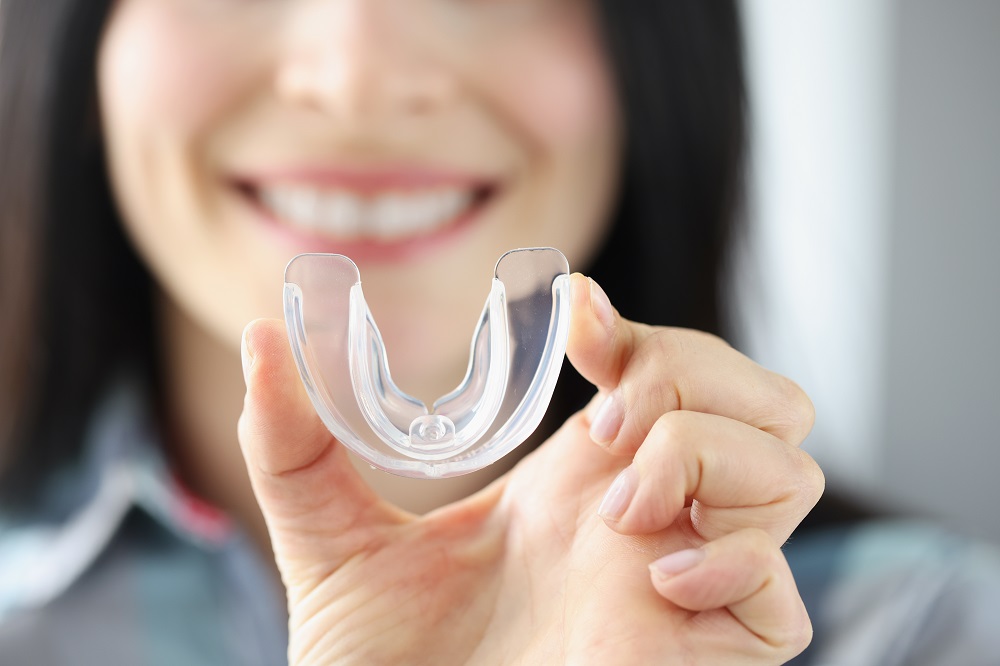
Mouthguards are tools used to shield your teeth from injury while playing sports or from grinding or clenching while you sleep. They can also assist in snore reduction and obstructive sleep apnea relief.
But not all mouthguards are identical. Depending on your demands, there are three primary types of devices available for you to purchase. Learn more about this treatment method by reading this blog and then contacting your dentist today.
What is a Mouthguard?
Dental devices that protect your teeth are called mouthguards. Patients can acquire one of three types of mouthguards: customized ones which are created in a dental lab; a boil-and-bite guard, or a stock guard. The use of mouthguards is beneficial for both children and adults.
Generally, these guards are worn across the top teeth. In some cases, your dentist could also advise getting a guard for your bottom teeth as well.
Who Should Use a Mouthguard?
The following situations necessitate getting mouthguards near you:
-
Bruxism
A sleep-related movement disorder called teeth clenching and grinding can generate a variety of issues, including jaw pain, sore gums, and tooth pain. It also seriously harms the teeth.
Children and adults who grind their teeth excessively at night are also good candidates for mouth guard. The top and bottom teeth remain separate while using this dental appliance while you sleep. By avoiding tooth injury, it eliminates bruxism.
-
Contact Sports
Only a select few sports, including football, hockey, basketball, soccer, etc., enhance the risk of facial injuries. A mouthguard is made of a soft, absorbent material that lessens the force of an impact on the teeth. Additionally, it shields the lips and tongue from harm. The majority of mouth-related sports injuries typically involve cut lips, fractured tooth roots, chipped or broken teeth, etc.
-
Activities with a High Fall Risk
For those who engage in leisure activities and non-contact sports with a high fall risk, a mouthguard is perfect. These include skateboarding, riding, ice skating, gymnastics, and more.
-
Snoring
Mouthguards can help reduce snoring as well. The upper airway tissue vibrates, which causes snoring. Typically, these dental appliances function the same way as apnea mouthguards. Call our dentist in Ipswich if snoring is interfering with your daily life.
-
TMD Issues
An effective solution for reducing symptoms of persistent jaw discomfort while opening the mouth or chewing food is a custom-made mouthguard. It functions by allowing the jaw muscle to rest and by lessening tooth wear while the user is sleeping. Headaches, a popping or clicking sound coupled with pain, etc. are all TMJ symptoms.
Can People with Braces Wear a Mouthguard?
Yes, sports-related issues are more likely to affect patients who have braces. Teeth become worn and torn when braces injure soft tissues when they come into contact with the mouth. A mouthguard fits comfortably over the braces. It lessens the chance that braces will get damaged. It’s because facial injuries can cause tooth braces and other fixed dental devices to get damaged. Therefore, both those who use braces and those who have fixed dental bridges should always wear a high-quality mouthguard.
You will receive a bespoke mouth guard from your orthodontist or dentist near you, which will provide excellent protection for your dental procedure. Therefore, before making a dental consultation, we suggest you adequately inform the orthodontist of your mouthguard needs.
Visit Ipswich Bay Dental Today
It might be challenging to determine whether headaches, tooth sensitivity, or fragmented teeth are brought on by bruxism, oral injuries acquired during sports, or TMJ disorder.
The team at our local dental practice can help you identify any oral problems and recommend the best course of action in order to preserve your smile for years to come. Email or phone us to make an appointment at a time that works for you!

